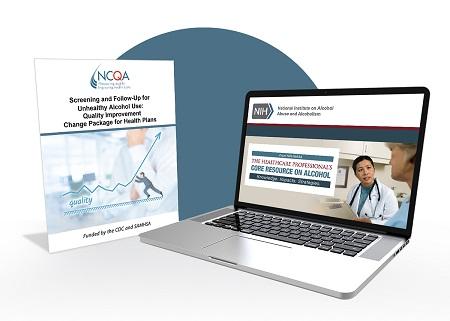Evidence-Based Alcohol Healthcare Resources for Health Plan Quality Improvement Leaders
Why Should Health Plans Adopt Alcohol-Related Quality Improvement Measures?
Health plans can make a meaningful difference in countless lives by adopting alcohol-related quality improvement measures. Alcohol screening and follow-up are evidence based, top-ranking clinical preventive services in terms of health impact and cost effectiveness. 1,2
Alcohol consumption contributes to more than 200 health conditions and is a leading cause of preventable death in the U.S. 3 Given current spikes in severe alcohol-related liver disease and deaths, 4,5 the need for evidence-based alcohol healthcare has never been more pressing.
Yet, alcohol-related health issues often go unaddressed in healthcare settings. 6 Outdated screening tools and a lack of follow up are common. 7,8
Pairing Two Free, Evidence-Based Resources Can Help Health Plans Improve Alcohol Healthcare
Now, adopting alcohol-related quality improvement measures can be facilitated by pairing two tools: a “change package for health plans” from the National Committee for Quality Assurance (NCQA) and the new Core Resource on Alcohol from NIAAA, which can help train your entire care team.
NCQA’s Screening and Follow-Up for Unhealthy Alcohol Use: Quality Improvement Change Package for Health Plans
Developed with funding from the U.S. Substance Abuse and Mental Health Services Administration and Centers for Disease Control, the change package provides how-to details and background on:
- The necessity and cost effectiveness of alcohol screening and follow up in routine care
- The HEDIS Measure for Unhealthy Alcohol Use Screening and Follow Up
- Key barriers to and facilitators of success in adopting alcohol-related quality improvement measures
- Strategies for leveraging existing resources for evidence-based alcohol care
NIAAA’s Healthcare Professional’s Core Resource on Alcohol
The Core Resource on Alcohol provides current, evidence-based content written and reviewed by 70 contributors, including practicing healthcare professionals and leaders in the fields of clinical and basic alcohol research. This definitive resource offers your healthcare team:
- 14 brief, free CME/CE articles on alcohol and health (.75 to 1 credit each; 10.75 total) for physicians, physician associates, nurses, psychologists, and pharmacists
- User-friendly, practical content on alcohol and health covering basic principles, clinical impacts, and streamlined patient care from screening through recovery
- An article devoted to promoting practice change by taking small, manageable steps, including 4 steps to build a better system of care and 4 steps to support the success of your new system
In addition, the NIAAA Core Resource provides links for healthcare systems and plans from federal health agencies and other authoritative sources, including:
- The U.S. Preventive Services Task Force recommendation for alcohol screening and brief intervention
- Guides for practice- and system-level implementation of alcohol healthcare, including telehealth services
- Resources for cultural adaptation and stigma reduction in alcohol healthcare delivery
- Reimbursement information for alcohol screening and brief intervention
Quality alcohol healthcare can make a difference not only for individual patients, but for entire families. With the NCQA change package and NIAAA’s Core Resource on Alcohol, your health plan has what it needs to begin.
References
1) O'Connor EA, Perdue LA, Senger CA, Rushkin M, Patnode CD, Bean SI, Jonas DE. Screening and Behavioral Counseling Interventions to Reduce Unhealthy Alcohol Use in Adolescents and Adults: Updated Evidence Report and Systematic Review for the US Preventive Services Task Force. JAMA. 2018 Nov 13;320(18):1910-1928.
2) Maciosek MV, LaFrance AB, Dehmer SP, et al. Updated Priorities Among Effective Clinical Preventive Services. Ann Fam Med. 2017;15(1):14-22.
3) Rehm J, et al. The relation between different dimensions of alcohol consumption and burden of disease: an overview. Addiction. 2010 May;105(5):817-43.
4) Dang K, Hirode G, Singal AK, Sundaram V, Wong RJ. Alcoholic Liver Disease Epidemiology in the United States: A Retrospective Analysis of 3 US Databases. Am J Gastroenterol. 2020 Jan;115(1):96–104.
5) White AM, Castle IP, Powell PA, Hingson RW, Koob GF. Alcohol-Related Deaths During the COVID-19 Pandemic. JAMA. 2022 May 3;327(17):1704-1706.
6) Chatterton B, Agnoli A, Schwarz EB, Fenton JJ. Alcohol Screening During US Primary Care Visits, 2014-2016. J Gen Intern Med. 2022 Jan 19.
7) Tan CH, Hungerford DW, Denny CH, McKnight-Eily LR. Screening for Alcohol Misuse: Practices Among U.S. Primary Care Providers, DocStyles 2016. Am J Prev Med. 2018;54(2):173-180.
8) McKnight-Eily LR, Okoro CA, Turay K, Acero C, Hungerford D. Screening for Alcohol Use and Brief Counseling of Adults - 13 States and the District of Columbia, 2017. MMWR Morb Mortal Wkly Rep. 2020;69(10):265-270


